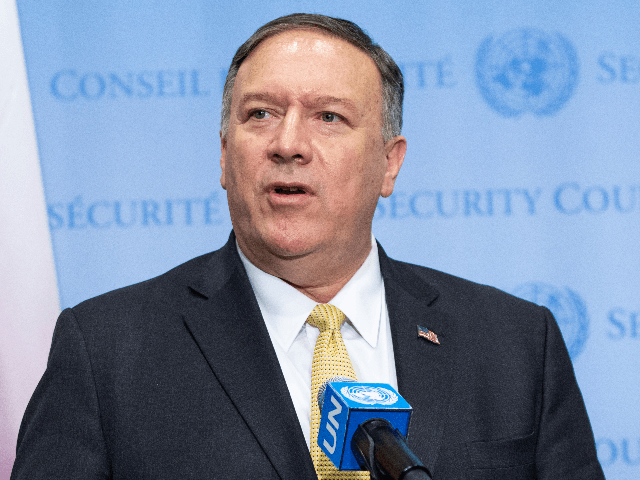Speaking from Jeddah, Saudi Arabia, on Thursday, Secretary of State Mike Pompeo said last weekend’s drone and missile attack on Saudi oil facilities was an “act of war” perpetrated by Iran.
Pompeo dismissed claims of responsibility by the Houthi insurgents of Yemen as “fraudulent,” but added even if they were true, the Houthis were acting as proxies for Tehran.
“This was an Iranian attack,” he told reporters. “It’s not the case that you can subcontract out the devastation of 5% of the world’s global energy supply and think that you can absolve yourself from responsibility.”
Pompeo said that even if the Houthis had launched the weapons involved in the attack, “it doesn’t change the fingerprints of the Ayatollah as having put at risk the global energy supply.” This was a reference to the Supreme Leader of Iran, Ayatollah Ali Khamenei.
The secretary of state made his low opinion of Houthi and Iranian honesty quite clear, advising the media to refer to the former as the “well-known frequently-lying Houthis” when writing about them.
“This is important because you ought not report them as if these truth-tellers, as if these are people who aren’t completely under the boot of the Iranians and who would not, at the direction of the Iranians, lay claim to attacks that they did not engage in. Which clearly was the case here,” he asserted.
Pompeo explained that U.S. intelligence is confident the Houthis do not possess the equipment to carry out the long-range precision strike that hit the Saudi facilities.
“These line attack cruise missiles we have never seen there and we think we’ve seen most everything. So the intelligence community has high confidence that these were not weapons that would have been in the possession of the Houthis. That’s probably the most important piece of information,” he said.
“We also know that these are systems that the Iranians have not deployed anyplace else, that they have not deployed outside of their country to the best of our knowledge. We’ve not seen them deploy these types of UAV systems with the kinds of ranges and capabilities nor have we seen them place these missiles where they could have done it,” he added.
“We were blessed that there were no Americans killed in this attack but any time you have an act of war of this nature, there’s always risk that that could happen. This is an attack of a scale we’ve just not seen before,” Pompeo said.
The Iranians continued on Wednesday to maintain their innocence and warn they will retaliate if any action is taken against them.
Hesameddin Ashena, an adviser to Iranian President Hassan Rouhani, derided the Saudi military’s press conference about the attack a “disaster” that proved “Saudi Arabia knows nothing about where the missiles and drones were made or launched from, and failed to explain why the country’s defense system failed to intercept them.”
At the Wednesday press conference Ashena referred to, a Saudi Defense Ministry spokesman said 25 drones and cruise missiles were involved in the attack and they originated from the direction of Iran.
The spokesman said Saudi forensic analysts are in possession of debris and electronic systems from the missiles and drones that appears to be of Iranian origin, specifically naming Iran’s Islamic Revolutionary Guard Corps (IRGC), and promised the evidence would soon be presented to the United Nations.
Iran sent a message through the Swiss embassy in Tehran, which handles diplomatic affairs with the United States, condemning accusations by Pompeo and other U.S. officials.
“Iran’s response will be prompt and strong, and it may include broader areas than the source of attacks,” the Iranians threatened.

COMMENTS
Please let us know if you're having issues with commenting.